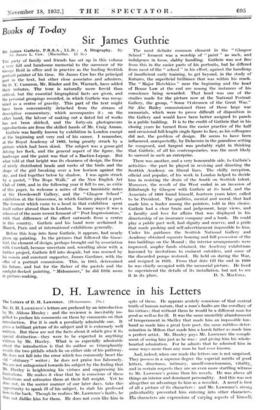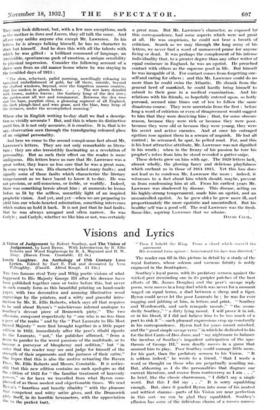D. H. Lawrence in his Letters
The Letters of D. H. Lawrence. (Heinemann. 21s.)
MR. D. H. LAWRENCE'S letters are prefaced by an introduction by Mr. Aldous Huxley : and the reviewer is inevitably im- pelled to preface his comments on them by comments on that introduction. For it is such a peculiarly admirable one. It gives a brilliant picture of its sUbject and it is extremely well written. But these are not the facts about it which give it its Special distinction—they were to be expected in anything written by Mr. Huxley. What is so especially admirable about the introduction is that its author so triumphantly avoids the two pitfalls which lie on either side of his pathway. Be does not fall into the error which too commonly beset the old " obituary " writer ; he does not praise too fulsomely. We are not antagonized towards his subject by the feeling that Mr. Huxley is heightening his virtues and suppressing his limitations. He makes it clear that he is conscious of these limitations and. estimate t them -at their full weight. Yet he does not, in the sorrier manner of our later days, take this 01Mortunity to speak ill of his subject, to stab his professed hero in the back. Though he realizes Mr. Lawrence's faults, he does not dislike him for them. He does not even like him in
spite of them. He appears acutely conscious of that central truth of human nature, that a Man's faults are the corollary of his virtues ; that without them he would be a different man for good as well as for ill. It was the same unearthly abandonment of temperament in Shelley that made him an impossible hus- band as made him a great lyric poet, the same ruthless deter- mination in Milton that made him a harsh father as made him a perfect artist. Mr. Huxley pays Mr. Lawrence the compli- ment of seeing him just as he was : and giving him his whole- hearted admiration. For he admits that he admired him in some ways more than any man he had ever known.
And, indeed, when one reads the letters one is not surprised. They possess in a supreme degree the especial merits of good letters, directness, intimacy, unself-consciousness, vitality, and in certain respects they are an even more startling witness to Mr. Lawrence's genius than his novels, He was above all things an intense and dominant personality. And this was not altogether an advantage to him as a novelist. A novel is first of all a picture of its characters : and Mr. Lawrence's strong individuality prevented him entering into other characters. His characters are expressions of varying aspects of himself. They may look different, but, with a few rare exceptions, such as the mother in Sons and Lovers, they all talk the same. And
all are very unlike anyone else except Mr. Lawrence. In his letters he is always talking himself, he has no character to draw but himself. And he does this with all the talents with which he was gifted : a brilliant command of language, an irresistible, spontaneous gush of emotion, a unique sensibility to physical impression. Consider the following account of a dawn seen from an old manor house where he was staying in the troubled days of 1915:
The slow, reluctant, pallid morning, unwillingly releasing its tarnished embellishment of gold, far off there, outside, beyond the shafted windows, beyond, over the forgotten unseen country, that lies sunken in gloom below. . . . The wet lawn drizzled with brown, sodden leaves ; the feathery heap of the ilex tree ; the garden-seat all -wet and reminiscent. Between the ilex tree and the bare, purplish elms, a gleaming segment of all England, the dark plough-land and wan grass, and the blue, hazy heap of the distance, under the accomplished morning."
Where else in English writing to-day shall we find a descrip-
tion so vividly accurate ? But, and this is where its distinctive merit lies, it is not only accurate, it is creative. It is, that is to say, observation seen through the transfiguring coloured glass of an original personality.
And here we come to the second conspicuous fact about Mr.
Lawrence's letters. They are not only remarkable as litera- ture; they are also irresistibly fascinating as a revelation of personality. But as such their effect on the reader is more
ambiguous. -His letters leave us sure that Mr. Lawrence was a great writer, they leave us less sure that he was a great man.
In some ways he was. His character lacked many faults ; and signally some of those faults which characterize the literary
temperament as we have learnt to know it to-day. He was not precious,.or self-conscious, or feeble, or worldly. Indeed, there was something heroic about .him: at moments he looms before us lit by the selfless, unearthly light of an inspired
prophetic vision. And yet, and yet—when we are preparing to yield him our whole-hearted admiration, something intervenes which makes us hold it back. It is not just that he had faults, that he was always arrogant and often narrow. So was Carlyle ; and Carlyle, whether we like him or not, was certainly a -great Man. But Mr. Lawrence's character, as exposed by' this correspondence, had some aspects which were not great at all. He was suspicious, he ,could not bear a breath of criticism. Search as we maY through the long array of his letters, we never find -a word of unreserved praise for anyone Jiving or dead. It was perhaps the complement of his intense individuality that, to a greater degree than any other writer of equal eminence in England, he was an egotist. He preached contact with others as the supreme good in life. But himself he was incapable of it. For contact comes from forgetting one- self and caring for others.; and this Mr. Lawrence could do no more than he could swim the Atlantic. He shrank from the general herd of mankind, he could hardly bring himself to submit to their gaze .in a medical examination. And his relations with his friends, so hopefully entered upon, so hotly • pursued, seemed nine times out of ten to follow the same disastrous course. They were uncertain from the first ; before Jong a word of criticism or even of disagreement would suggest to him that they were deceiving him ; that, for some obscure reason, because they were rich or because they were poor. tiecause they were old or because they were young, they were his secret and active enemies. And at once his outraged egotism rose against them in a scream of anguish. He lost all control ; he screamed, he spat, he pelted mud. For, and this is his least attractive attribute, Mr. Lawrence was not dignified in his wrath ; when in the frenzy of his passion he tore his prophet's robes from him he stood revealed a gutter-snipe.
• These defects grew on him with age. The 1929 letters lack, almost wholly, the glowing fancy and delicious playfulness which enchant us in those of 1914-1915. Yet this loss does not lead us to condemn Mr. Lawrence the more ; indeed, it- witnesses to a fact about him which should, maybe, prevent. us from condemning him at all. From his earliest. years Mr. Lawrence was shadowed by disease. This disease, acting on his highly-strung temperament, made him an egotist, and an =controlled egotist. As he grew olthr he grew more ill, and proportionately the more egotistic and uncontrolled. But his healthy self was a good self. The real Lawrence was the fresh, flame-like, aspiring Lawrence that we admire.
4 • DAVIR CECUL4

































































 Previous page
Previous page